The Future is Mental Wellness
- Published: Wednesday, November 1st 2017
- in Living Well
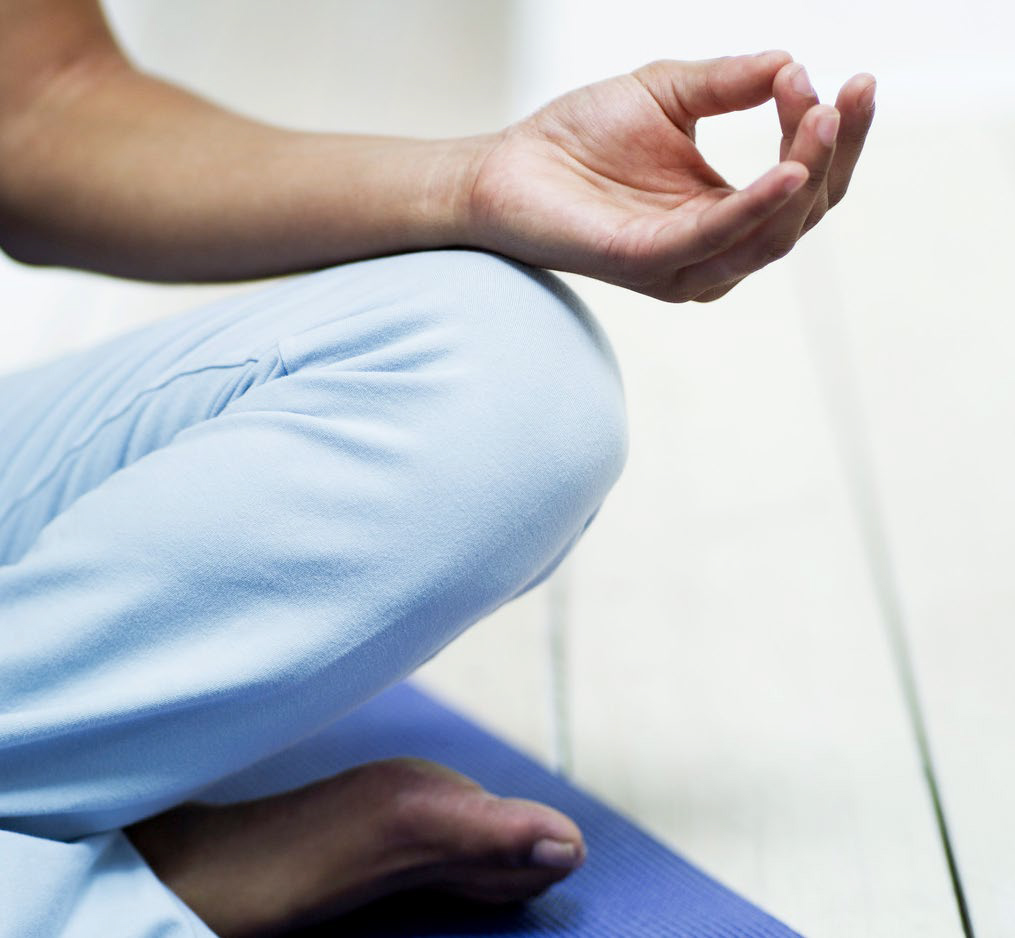
Mental wellness will be the biggest future trend, period: from wellness destinations bringing in neuroscientists and psychotherapists – to meditation becoming seriously mainstream, while evolving into new breeds – to part-mind, part-body workout brands – to apps that track your mental state.
Despite our era of historic economic abundance, depression, anxiety disorders, loneliness, addiction and suicide is skyrocketing. So much so that the World Health Organization has forecast that by 2030 the largest health risk on earth will be depression (not obesity).
Leading integrative medical experts, like Dr. Elke Benedetto-Reisch and Nils Behrens (Lanserhof Group); Drs. Harry and Imke Koenig (Brenner’s Park Hotel & Spa); and Dr. Christine Stossier (VIVAMAYR Medical Clinic) outlined the serious new problems they’re seeing: from “total burnout” to exploding disorders around stress and the “gut” – with agreement that traditional medicine tends not to see the whole (emotional) patient, or act on evidence that the mind influences every cell in the body.
They argued that the wellness industry must zero in on teaching people “the discipline of living again”: to restore day and night, work and rest, learn the connection between bad food and bad mood, and the (painful) discipline of digitally disconnecting.
Governments will recognize that a focus on mental wellbeing and happiness is an important key to turning around declining productivity and rising social instability.
For instance, Jan- Emmanuel De Neve (economics professor, Oxford University; co-editor of the UN’s World Happiness Report) keynoted on how nations (like the UAE, with their new “Minister of Happiness”), which used to focus only on GDP, are now looking closely at new measures of (and new policies to drive more) national happiness, because “happiness” drives the economy: from studies showing that unhappy teens earn significantly less as adults, to ones showing happy workers are significantly more productive.
The Past
A physical health focus has dominated in the wellness industry, over-shadowing mental wellbeing and happiness. If the term “mind/ body” found a welcome audience within the spa and wellness community, “body/mind” would have been a truer representation. Yes, in the past decade yoga, meditation and mindfulness evolved into mainstream wellness approaches. And during the 2013 Summit in New Delhi, India, His Holiness the Dalai Lama made it very clear in his presentation, “a healthy mind is the key factor for a healthy body…wellness must include a happy mind.”
Gerry Bodeker, PhD (clinical psychologist; professor, Oxford and Columbia Universities) laid it on the line for the wellness industry, arguing, “It’s time to put a stake in the ground and say … we care about this mental wellness crisis and we’re already doing something about it.
Because wellness approaches like meditation, exercise, yoga and healthy food already have strong medical evidence for transformative neurological effects, and make a powerful case for a ‘mental wellness’ pathway that’s distinct from what’s been long offered in the world of ‘mental health’”.
The future: “mind” will finally matter as much as “body”– and so many new approaches to driving less stress and more happiness will be one of the biggest, future industry trends.
THE TREND
Mental disorders are skyrocketing globally: between 1990 and today, people suffering from depression or anxiety increased roughly 50% (to over 600 million people – WHO). Antidepressant use has exploded in OECD countries, but simultaneously depression, anxiety disorders, PTSD, OCD, phobias (and suicide) keep climbing. We all know the new forces conspiring to make us more miserable: from rising global economic inequality to constant digital/work/media connection.
Social media (keeping us “alone together”) takes its terrible toll: consider a new NHS study revealing that more than one in four young women (aged 16-24 – the ultimate “selfie” generation) now have a mental health condition like depression or anxiety.
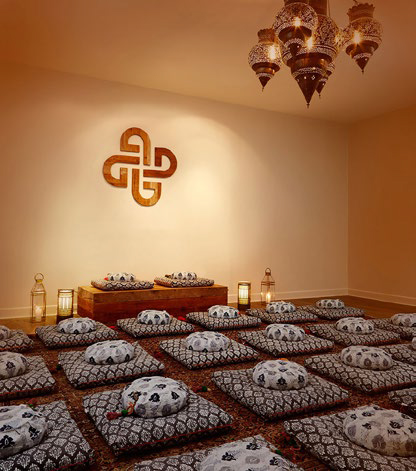
The Den in LA – one of the new, unintimidating “drop-in-and meditate” studios. Image Source: The Den Meditation in LA.
And from “fake news” to our social media “bubbles”, the very idea of an agreed-upon “reality” is fast disappearing.
No wonder that Oxford English Dictionary named “post-truth” the 2016 word of the year, or that the Danish wellbeing concept of “hygge” – burying oneself into cozy, nest-like environments – was runner-up.
People feel crazier, sadder and angrier…and need relief.
ASPECTS OF TREND
- New “integrative” mental wellness approaches: including hotels, wellness retreats and spas bringing in psychotherapists and neuroscientists.
- Meditation exploding into the accessible mainstream: from dedicated “drop-in” meditation studios to far more mindfulness programming at hotels, retreats, spas, cruises, schools, hospitals, and even governments.
- Sleep programs are hitting THE tipping-point: whether wellness destinations bringing in doctors to design sleep-inducing programs/ rooms to retreats offering each guest a dedicated “Sleep Ambassador.”
- So many new directions, from a dedicated focus on breath work and breathing classes (as proper breathing controls stress response and brain waves) to “bibliotherapy”, the prescription of specific literary works as therapy, as readers of literature have lower rates of depression and stress.
- New “mind/body” fitness brands that marry physical workouts with all kinds of interwoven meditation and neuroplasticity approaches.
- Once “really out there”, mystical, New Age-y mental solutions going mainstream: from shamans as mental coaches to trippy sound baths.
- Yes, the continued explosion of meditation apps, but also new “tracking” apps that measure your mental wellness (stress, breaths taken, etc.). Think “MindBit” not “FitBit”.
- A new focus on creativity and the arts – and “silence” and digital disconnection.
WELLNESS APPROACHES ARE “MENTAL MEDICINE”
Dr. Gerry Bodeker argued that the wellness industry has been too passive in communicating the strong medical evidence for so many wellness modalities’ impact on mental health.
A big meta-analysis of past studies (data on 1.1 million people) re-confirmed the powerful connection between regular exercise and mental health: people in the lowest third for aerobic fitness levels were 75% more likely to have received a depression diagnosis than those in the top third.
A 2016 Oxford University meta-analysis found that mindfulness-based therapy was more effective at reducing depression relapses than antidepressant medication.
A 2015 meta-review found that yoga improved symptom scores for anxiety and depression by about 40%. And a large, new Ghent University meta-review showed that happiness isn’t just some “feeling”, it improves focus, imagination and complex issues of mental flexibility – i.e., the very way your brain processes external and internal information.
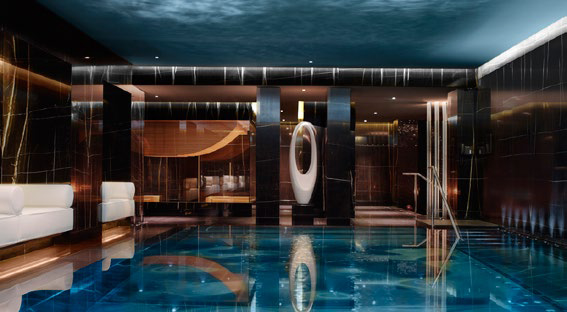
ESPA Life at Corinthia Hotel London has just brought in a “Neuroscientist in Residence” – Dr. Tara Swart from MIT – for an “integrative” approach to mental wellness. Image Source: ESPA Life at Corinthia Hotel.
NEW DIRECTIONS – EXAMPLES:
Integrative Mental Wellness at Retreats & Spas:
At Hotel Café Royal’s Akasha spa (London) a cognitive therapist joins the packed roster of wellness specialists in nutrition, meditation, reiki, etc. At Stanglwirt (Kitzbuhel, Austria) a resident clinical psychologist offers everything from relaxation hypnosis to burnout prevention.
ESPA Life at Corinthia Hotel London has just brought in a “Neuroscientist in Residence” (Dr. Tara Swart from MIT) to create new programs tackling mental wellness, resilience and positivity.
The Arrigo Program retreats (first for women, now adding men), at hideaways in the UK, France, Italy, Spain and Sri Lanka, squarely focus on helping people find their mental footing. Led by famed psychotherapist, Fiona Arrigo, the team of therapists cover everything from neurotherapy to breath work to addiction counseling. And now The Surrey Hotel (NYC) is bringing in Arrigo for an intensive “Mind Cleanse” program.
Meditation Mania:
Drop-In Studios: From The Den and Unplug in LA, to MNDFL in NYC, new, unintimidating “just-drop- in-and meditate” studios are making the practice a lunchtime possibility. The new Inscape (NYC) is the first “multi-platform meditation brand”, operating classes at its Manhattan studio and with an app like Headspace.
On-demand meditation: At The Benjamin (NYC), as part of their doctor-designed “Rest & Renew” sleep program, you just pick up the phone and select either mindfulness or mantra meditation. Park Hyatt New York just partnered with drop-in studio MNDFL for both in-room meditation and group classes in their vast Spa Nalai.
“Meditation” Goes Plural: You know a market is in high gear when varietals bloom. At more hospitality brands (like Mandarin Oriental New York) you can bask in beyond-trendy, sound bath meditation – at Solage Calistoga (California) you can take “floating meditation” classes, with visualization and breathing exercises played out on rafts in the geothermal pool.
Euromonitor recently flagged the trend of “mindfulness safaris” rising across Africa – and Seabourn Cruises will launch a fleet-wide mindful living program in 2017, born out of a partnership with Dr. Andrew Weil.
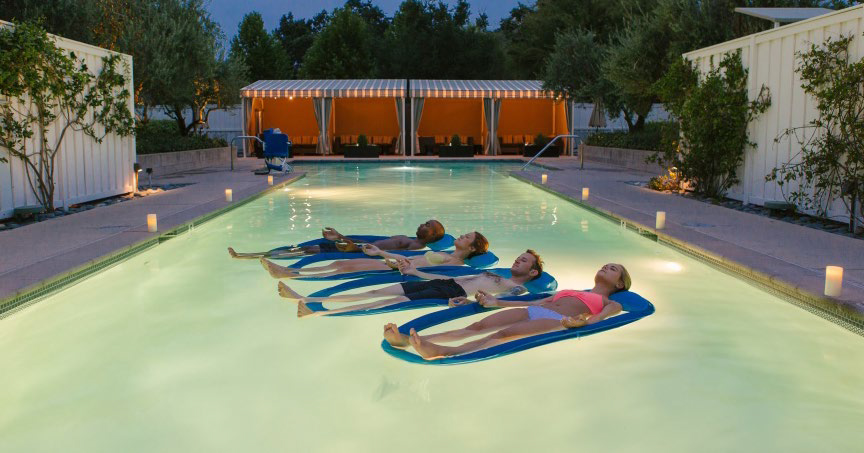
At Solage Resort & Spa (Calistoga, California) you can experience “floating meditation.” Image Source: Solage Resort & Spa by Briana Marie.
Sleep Is “It”:
As Nils Behrens of Lanserhof Group put it at the Summit: “Sleep is the new black.” The sleep and mental wellness connection is now being communicated everywhere, like at Arianna Huffington’s new mental wellness media platform Thrive Global, whose mission is to “end the epidemic of stress and burnout”, and with the main focus on sleep. (First product is “The Phone Bed,” a charging station that puts a family’s devices “to bed” outside their bedrooms.)
Champneys Tring’s (UK) new sleep retreat includes everything from six sleep treatment sessions to sleep massages. Rancho La Puerta (Mexico) provides guests with “sleeping bags” for mobile phones. And Six Senses Resorts are rolling out a comprehensive program, designed by famous sleep doctor, Michael J. Breus, with rooms
featuring handmade mattresses; organic pillows,
sheets and duvets with cooling and breathing
zones; circadian lighting and “total blackout.”
Or opt for a Sleep Ambassador who fine-tunes
your room for your optimal sleep conditions
and reviews your sleep-tracker app data to
recommend a healthy new regime.
The Future
Due to increasing levels of stress as well as a greater understanding of brain science, the proper relationship between mind/ body is getting clearer. With an alarming mental wellness crisis (spiking depression, anxiety, etc.), wellness retreats, spas, fitness studios, schools, workplaces and governments will step up “healthy mind” programming…in 2017 and beyond.
From Breathing Classes to Bibliotherapy:
More Breath Work: Studies show that breathing controls brain waves that can reduce symptoms of anxiety, insomnia, PTSD, depression and even ADD. Breathing training has been called practical meditation for people who can’t meditate. Andaman (Langkawi Island, Malaysia) has a new detox program where meditation and the yogic art of breathing are the centerpieces. Breath training will even become central to the new “mindful” spa treatments, like “The Happiness Treatment” at Neom Organics (London) with guided meditation and breath work.
Book Therapy: When you consider the surge in unhappiness, one needs to ponder what modern culture has lost, and it’s reading literature. Nearly a quarter of American adults have not read a single book in the last year, and in the UK, less than 1 in 5 bought a novel or a book of stories/ poetry in the last year. It’s a problem, because studies show that reading puts our brains in a trance-like meditative state, and that regular readers have lower stress, depression, and sleep better than people who don’t read.
An excellent New Yorker article (6/2016) on the subject, ”Can Reading Make You Happier?”, detailed the rise in “bibliotherapy” – or specialists (like the School of Life Clinic, with trained therapists around the world) prescribing expert- chosen literary fiction as mental therapy.
The Trippier, The Trendier: One of the most striking things about the wellness landscape today is how practices that would have been seen as “way out there,” or overly mystical, five years ago, are now the hottest trends. A sign that desperately stressed people are seeking farther and wider for mental wellness.
Shamans are the new life and mind coaches, like at Tierra Santa Healing House (Miami Beach), a wellness center focused on indigenous South American healing, who’s brought in a high-profile shaman for its Shaman Purification Rituals.
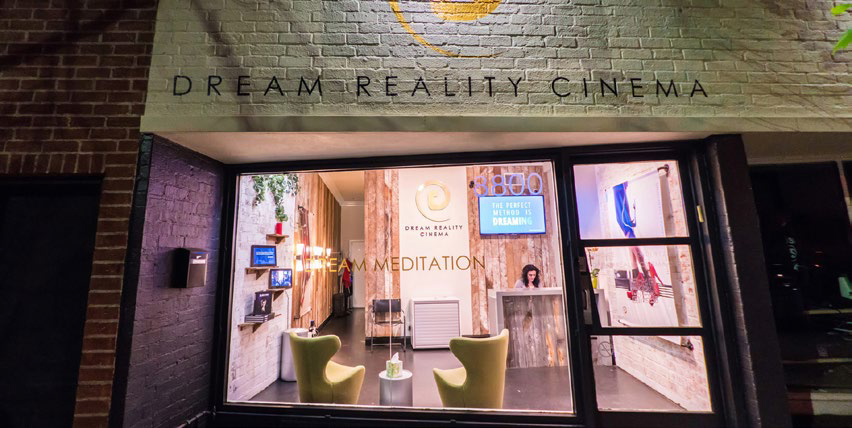
Dream meditation is rising, to clean out the subconscious and tackle everything from traumatic stress to sleep disorders – like at Dream Reality Cinema (Beverly Hills). Image Source: Dream Reality Cinema.
“Conscious” or “lucid” dreaming and dream meditation is rising, to clean out the subconscious and tackle everything from traumatic stress to sleep disorders. Like at Dream Reality Cinema (Beverly Hills) where you lie in zero gravity chairs in what’s essentially a “wellness cinema”, with virtual reality glasses and headphones taking you on a guided “movie” meditation.
Beyond Cannabis – Psychedelics: While cannabis has been a hot wellness topic for years, more intense (and also natural, plant- based) psychedelics like ayahuasca and magic mushrooms (psilocybin) are increasingly being used with therapeutic intention to tackle issues from chronic depression to phobias. Don’t expect psychedelics in wellness establishments soon – but it’s notable that it’s the medical establishment that’s leading investigations.
Meditative, Neuroscience-Inspired Workouts:
New fitness brands that work the mind AND body are appearing. Like Headstrong (Equinox gyms, NYC, California, Chicago and London) that uses neuroplasticity concepts to underpin a 4-step group workout (Focus, Adapt, Willpower and Reboot), that aids in memory and learning. Or In-Trinity, a brainy concept that melds meditation, yoga, Pilates and martial arts – all performed atop an ergonomic, slanted board – while listening to music that incites meditative brainwaves.
MIND TRACKERS (SLIDE OVER FITBIT)
The explosion of meditation apps – from Headspace to Buddhify – have democratized mindfulness, bringing it to anyone with a smartphone. But beyond the mindfulness apps, the new fitness trackers will trend “mental.” In David Bosshart’s Summit keynote (called “Data Buddhism”) he outlined the incredibly complex ways that a future of ever-more connected data will change everything: from humans turning increasingly “inward” to an increased use of technology to quantify (not just how many steps you took) but your mental, emotional and spiritual states (in our endless quest for “an ever-better self”). For instance, apps like Spire Mindfulness Tracker (from Stanford University) analyze your stress by monitoring breathing patterns, and pinpoint what in your day stresses you out.
THE FUTURE
In the past, the wellness world has tread lightly around asserting its role in tackling mental issues. Yes, they have (softly) broadcast that core approaches like meditation, yoga and exercise (if done regularly) have eye-opening impact. But now, as Dr. Gerry Bodeker argues, they will “stick a flag in the ground”, put the mounting evidence more loudly on their side, and create new mental wellness programs and “paths” that are very, very different from what we’ve known as “mental health” approaches in the past – often a big pile of pills.
The world is only going to get more “mental”: more stressful, with more relentless digital and media overload. And wellness retreats, spas and fitness studios – and workplaces, governments, schools and hospitals – will necessarily “shift mental,” putting far more emphasis on (and creating important new approaches for) helping desperate people get less anxious and happier. The traditional medical world will shift, too, with the World Health Organization recently pronouncing that mental health is one of its top priorities in the next decade. It’s a powerful opportunity and a moral imperative, and wellness for the mind will be one of the most meaningful, powerful trends for decades to come.
Just as wellness tourism developed alongside of, yet distinct from, medical tourism, look for mental wellness to develop alongside, and distinct from, mental health. The distinction is an important one, and mental wellness will be a new category and culture, with very new paths to emotional wellbeing and happiness.
TOP 8 SPA & WELLNESS TRENDS FOR 2017
- Sauna Reinvented
- Wellness Architecture
- Silence: A New Wellness Trend
- Art & Creativity Take Center Stage
- Wellness Remakes Beauty
- The Future is Mental Wellness
- Embracing Cancer at the Spa
- Beyond the Elite Ghettos of Wellness



